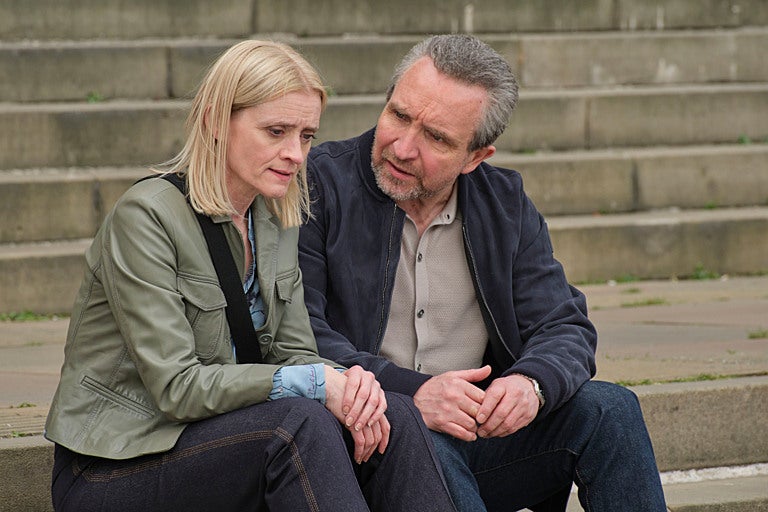BBC One’s sign-language-filled Reunion is a crime thriller with one big twist
This intense four-parter starring Matthew Gurney, Anne-Marie Duff and Rose Ayling-Ellis is a claustrophobic tale of revenge and redemption
There’s never been a TV drama lead quite like Matthew Gurney’s Daniel Brennan before. He’s a big man with a withering stare, wild eyes and an air of volatility. For much of BBC One’s Reunion, he’s an ambiguous figure: is he a hero? An anti-hero? Or simply a villain? As we meet him, he’s emerging from a decade in prison – but even in his exit interview, the world is conspiring against him. Daniel is deaf, but his probation officer has neglected to book a British Sign Language (BSL) interpreter, so the conversation plays out as an agitated series of hopeless gestures. The official pointlessly and patronisingly carries on regardless. No part of this process is really designed for Daniel’s benefit – it’s just a box to tick.
This failure of communication signposts the dominant note of this drama. Reunion is, in many ways, a groundbreaking show: set in Sheffield, it’s written by deaf scriptwriter William Mager and many of the production team are also deaf. This has clearly created an environment reflecting deaf people’s experience of living in a world that doesn’t respond to their needs. Daniel is returning to a community where he is a pariah – he was convicted of murdering his hugely popular former friend and sometime mentor Ray (Ace Mahbaz) – but will he be given the opportunity to reconnect with his daughter Carly (Lara Peake) and explain the context of his crime? Indeed, is there any imaginable context in which it could be justifiable?
As soon becomes clear, there’s plenty more to the story than meets the eye; a series of traumas rooted in childhood and never really resolved. Daniel has deprived Anne-Marie Duff’s Christine of a husband and her daughter Miri (Rose Ayling-Ellis) of a father. At first, he finds it impossible to say why – and the suspicions of Christine’s new partner, ex-cop Stephen (Eddie Marsan), make things harder still. Before long, Reunion becomes a story about communication in a more general sense: in narrative terms, Daniel’s deafness is not a bug but a feature. Deafness becomes almost a metaphor for a more general failure to confront the past – a universal omerta about men and their feelings. Is Daniel’s crime rooted in a simple inability to move on?
His deafness is also at the root of his combustibility and trust issues. His struggles for expression underpin his occasional bursts of violence. And the format of the drama carefully brings viewers into this world: long, intense conversations are conducted in BSL and – sometimes, more bewilderingly – in a mixture of gestures and frantic, wordless sounds. There’s a bleak flashback to Daniel’s time in prison. One of the inmates is threatening him and we hear him “speak” conventionally for the first time. His strange, high-pitched yelp is at odds with his menacing appearance. His fellow prisoners laugh and their mockery lays his impotent frustration bare. It’s a rarity to meet a disabled TV character with a latent capacity for violence – but as we see the world through Daniel’s eyes, it’s easy to see why he might feel he has no other options.

The climactic moments are played out almost entirely in BSL; having acclimatised viewers, Reunion goes for full immersion when it really matters. It gives the scenes a real power – the world shrinking around the desperate attempts at communication between two people. The sound design is an important part of this journey and is impeccably done; tiny details – a finger tapping on a table, a frying egg, a dripping tap – are amplified. Voices are alternately clear, muffled and non-existent. At times, it’s difficult to feel fully orientated in this world – and that’s almost certainly the intention.
Because Daniel isn’t at home here either – he drifts from house parties to memorial services, from thwarted moments of domesticity to living out of the back of his car – unable to explain himself or to find closure. At times, Reunion almost feels like a western with Daniel acting out the Lonely Stranger archetype – the difference being that everyone he meets knows Daniel only too well and has already passed judgment upon him.
None of this would work without a fine central performance and Gurney is exemplary – in fact, while the script could occasionally benefit from a greater focus on Daniel’s tormented interior life, Gurney’s expressive face does plenty of heavy lifting on its own. Reunion isn’t an easy watch for a number of reasons – the subject matter is difficult, and the format means full commitment is required. But it is unapologetically itself, and the world it creates is all the more convincing as a result.
Join our commenting forum
Join thought-provoking conversations, follow other Independent readers and see their replies
Comments
Bookmark popover
Removed from bookmarks